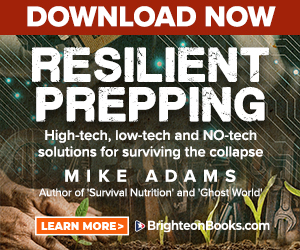
Concern Develops for Iodine Levels in Australian Foods
Friday, October 15, 2010 by: Deb Campbell
Tags: iodine, foods, health news
- Amazing microscopy photos reveal how freezing crystals attempt to mimic electronic structures they are touching
- The dark truth behind Ozempic and Wegovy: Big Pharma's profit-driven gamble with your health
- Biden administration targeted mask and vaccine opponents as "terrorists," new docs reveal
- Toxicologist reveals four simple ways to slash microplastics in your drinking water
- This overlooked class of food additives is linked to Crohn's disease and cancer
- POST-PANDEMIC DEATH SPIRAL: Over 1.5 million avoidable deaths occurred in USA AFTER Covid-19 mostly disappeared - must be the deadly mRNA JABS
- North Carolina Supreme Court rules federal vaccine immunity doesn't trump parental rights
- Centenarians’ genetic and lifestyle secrets unlock path to living healthy to 100
- Acetaminophen and antidepressants lead to childhood ER visits at significant rate — a symptom of a bigger problem poisoning kids’ brains
- TCM's timeless secrets for liver health and better sleep
- YouTube erases top Canadian political channel after Canadian Broadcasting Corporation initiates smear campaign
- Scientists warn Venus hides deadly “city-killer” asteroids with Earth in their crosshairs
- “Bomb the data centers”: Eric Schmidt sounds AI war warning amid U.S.-China race
- A closer look at the corporate influences steering the CDC and manipulating US health policy
- The hidden dangers of plant-based milks and soy formula: Why your toddler needs real dairy
- Vaccines are driving the autism epidemic and studies already point this out, but the vaccine industry is protected
- Universal flu vaccine advancing: Government’s chimeric experiment risks unleashing uncontrollable mutations, sets pretense for new pandemics
- CDC confirms emergence of China-linked COVID-19 variant in U.S. amid global surge
- Globalists call for “celebration” of plunging human fertility as war against humanity accelerates
- WHO Pandemic Treaty sparks sovereignty concerns amid secretive voting and U.S. withdrawal
- Microsoft exposed for SILENCING EMAILS that discuss genocide in Gaza, while fueling Israel's war machine with AI and cloud tech
- HEALTH SECRETS: How to Instantly Block MSG Toxicity Using Natural Substances (and the secret of Methylene Blue)
- WAR ON COGNITION: The Coordinated Assault on Your Brain and How to Defend Yourself Against Every Attack
- Lost 5,000-year-old civilization uncovered beneath Arabian sands
- MSG EXPOSED: Hidden Neurotoxins Found in Groceries, Snacks and Popular Fast Food Menus
- The 20 deadliest sugar-loaded foods and how to replace them before they kill you
- Trump signs controversial Take It Down Act amid concerns of censorship and government overreach
- METHOD OF OPERATION SINISTER: Get everyone vaccinated for Covid BEFORE they figure out how deadly the mRNA jabs really are - that was the plot
- Big Pharma's Dirty Secret: How Prescription Drugs Are Starving Your Body of Essential Nutrients
- RED ALERT: Nuclear War Between India and Pakistan Could Trigger Global Catastrophe… full RISK ANALYSIS
- FDA forces Pfizer, Moderna to admit COVID vaccines cause lasting heart damage in young males
- Vitamin C: A potential game-changer in cancer treatment
- China's orbital AI leap: Space-based computing constellation launch ignites global tech competition
- An inexpensive and forgotten superfood: BEANS are key to reversing chronic disease
- Merck's mumps fraud: A 50-year cover-up exposed as vaccine efficacy claims crumble
- Study: Dark chocolate and tea may lower blood pressure as effectively as medication
- Big Pharma's Dirty Secret: How Prescription Drugs Are Starving Your Body of Essential Nutrients
- RED ALERT: Nuclear War Between India and Pakistan Could Trigger Global Catastrophe… full RISK ANALYSIS
- WAR ON COGNITION: The Coordinated Assault on Your Brain and How to Defend Yourself Against Every Attack
- Singapore's draconian vaccine mandate: Citizens face jail time for refusing FORCED medical procedures that do HARM
- Head of L.A. Port warns of incoming plunge in U.S. supply chain, empty shelves and inventory depletion in 5-7 weeks
- URGENT REPORT: The China Import Embargo - What to Stockpile Now Before America Runs Out
- Trump Unleashes Economic Doomsday on America with "Secondary Sanctions" that BLOCK all Exports from China, with NO exceptions!
- JESUS NEVER SPOKE ENGLISH: Historical facts on why the Bible you’re probably reading has been altered, redacted or hidden from much of its original meaning
- EU's digital censorship SURTAX and vaccine "misinformation" CRACKDOWN targets vaccine truth seekers in Orwellian push for conformity
- Why All Government Officials and Big Tech CEOs Who Engage in Systematic Viewpoint Censorship Must Be ARRESTED, Prosecuted, and Sentenced to Life in Prison
- Rubio exposes Biden's surveillance of American dissent: Outrageous free speech violations
- MSG EXPOSED: Hidden Neurotoxins Found in Groceries, Snacks and Popular Fast Food Menus
- U.S. Government's Bio-War Against America: 15 Historical Medical Horrors Inflicted on the American People by the Government Itself
- HEALTH SECRETS: How to Instantly Block MSG Toxicity Using Natural Substances (and the secret of Methylene Blue)
- Why the Trump administration will FAIL, and America’s economy, military and industrial base will COLLAPSE if Trump’s weaponized tariffs aren’t halted
- BitChute CEO warns U.K. heading toward “China-style internet censorship”
- Landmark study of 85 million reveals shocking surge in heart attacks, strokes, and sudden death following the notorious COVID-19 jab
- ELEMENTAL CRISIS: How China and Russia Control the Critical Minerals Needed for AI, Military Robots, and Economic Domination
- Red Cross issues warning to stop blood plasma donations from vaccinated people
- Scientists confirm: GENIUS brain function can be spontaneously unleashed in humans without any apparent cause
- EPA advisor admits the agency is funneling billions to climate groups ahead of Trump’s return to White House
- HYSSOP: What research reveals about the health benefits of this ancient holy herb
- Two containers with completed ballots fall out of truck in Florida
- Newly released JFK files reveal Pentagon's role in creating Lyme disease and covid in the same lab
- Mike Adams releases country western hit single: Goin’ Back in Time is Comin’ Home
- Global leaders unite to clamp down on “misinformation” with UN-backed Cascais Declaration
- BREAKING: 2025 NDAA authorizes mandatory military draft of WOMEN across America… as Pentagon pursues global NUCLEAR war with both Russia and China at the same time
- I Want My Bailout Money – new song released by Mike Adams
- Michael Yon warns of a ZIONIST TAKEOVER in Trump’s second administration
- BOMBSHELL: DNA testing kits are a SCAM to develop ethnic-specific bioweapons
- Ozempic and Wegovy weight loss drugs are injectable LIZARD VENOM PEPTIDES that may unleash a devastating wave of organ failure… side effects align with symptoms of SNAKE BITES
- The Health Ranger releases “Vaccine Zombie” song and music video, using AI-animated zombies for the music video
- These 13 countries just signed an agreement to engineer a global FAMINE by destroying food supply
- Israeli soldiers accused of even more torture and abuse in the West Bank
- RFK Jr. clears key hurdle: Sen. Susan Collins backs controversial HHS nominee, signaling a new era for health policy
- Sermon 30: How Jesus reveals Caesar’s FAKE CURRENCY and FALSE AUTHORITY
A popular brand of soy milk in Australia has been found to have caused illnesses in at least eight people who consumed the product. In addition to these cases, a researcher at Sydney University has found that "between January and June 2010, 48 retrospective Australian cases of thyroid dysfunction associated with this brand of soy milk were also notified to local public health authorities".
Iodine intake above a certain level is known to cause problems in thyroid function for otherwise healthy adults and babies. The thyroid gland is vital to metabolism, growth and development. In adults an excess of iodine can result in over-activity (hyperthyroidism) of the gland which can lead to issues: such as anxiety, heart palpitations, diarrhoea, irritability, insomnia and other complications. More concerning though is that babies who have received it via breast milk can experience the reverse: an under-active thyroid (hypothyroidism). When occurring at such a young age, this can lead to very damaging long-term issues in affected children.
A prime example is seen in developing countries where hypothyroidism is much more common; many children are experiencing as a consequence enlarged glands (goiter), stunted growth, mental retardation and thyroid problems for life.
The excess doses seen in Australia in a soy product is alarming given soy consumption has increased dramatically in developed cultures over the past decade among people of all ages. Authorities are now seeking ways to increase the monitoring of imported foods like soy, as well as commercially available seafood preparations. Seafood is a potential problem because it is a naturally rich source of iodine, so keeping levels within a safe range is essential.
Current recommended safe intake of iodine is relatively small compared to other nutrients and is dependent upon age.
- Younger children (1 to 8 years) 90ug*
- Older children (9 to 13 years, boys and girls) 120ug
- Adolescents (14 to 18 years): 150ug
- Adults: 150ug
- Pregnant and breastfeeding women: 220ug and 270ug respectively.
*1 ug = 1 microgram
Other natural sources of iodine include dairy, eggs, some vegetables and iodine supplements.
The soy case has been filed in the Supreme Court and the number of claimants is expected to rise.
Sources:
http://www.news-medical.net/news/20101003/He...
http://www.heraldsun.com.au/news/national/bo...
http://www.betterhealth.vic.gov.au/bhcv2/bhc...
About the author
Debbie Campbell is a Health and Wellness expert who has been coaching and training people in Australia and overseas for over 10 years. Her experience has included work as a Personal Trainer, Massage Therapist, Pilates practitioner and Health/Wellness Presenter. She believes that anyone is capable of creating the health that they desire through the fundamentals of; education, conscious living and a consistent focus toward what they want. Her current projects involve educational workshops with her brother Dave (www.debndavehealthsolutions.com) as well as individual health coaching and fitness training through her own business (www.backintraining.com)Iodine at FETCH.news
Get independent news alerts on natural cures, food lab tests, cannabis medicine, science, robotics, drones, privacy and more.
Take Action: Support Natural News by linking to this article from your website
Permalink to this article:
Embed article link: (copy HTML code below):
Reprinting this article:
Non-commercial use OK, cite NaturalNews.com with clickable link.
Follow Natural News on Facebook, Twitter, Google Plus, and Pinterest
Science News & Studies
Medicine News and Information
Food News & Studies
Health News & Studies
Herbs News & Information
Pollution News & Studies
Cancer News & Studies
Climate News & Studies
Survival News & Information
Gear News & Information
News covering technology, stocks, hackers, and more



"Big Tech and mainstream media are constantly trying to silence the independent voices that dare to bring you the truth about toxic food ingredients, dangerous medications and the failed, fraudulent science of the profit-driven medical establishment.
Email is one of the best ways to make sure you stay informed, without the censorship of the tech giants (Google, Apple, Facebook, Twitter, YouTube, etc.). Stay informed and you'll even likely learn information that may help save your own life."
–The Health Ranger, Mike Adams












































